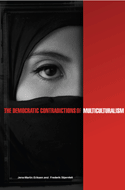Telos Press is pleased to announce the upcoming publication of The Democratic Contradictions of Multiculturalism by Jens-Martin Eriksen and Frederik Stjernfelt. This title will be available on March 1, 2012. Pre-order your copy now, and we will ship it to you as soon as it is available. Save 20% when you purchase on the Telos Press website.
 What is multiculturalism? Is it every person’s right in a democratic society to choose his or her religion and culture and to express criticism regardless of taboos and moralistic norms? Or is it, on the contrary, the right of cultures and religions to be protected from insult and to preserve themselves against change? In The Democratic Contradictions of Multiculturalism, Jens-Martin Eriksen and Frederik Stjernfelt examine these questions in relation to both the ideology and the reality of multiculturalism. The discussion covers a range of issues, including the Muhammad cartoons, laws against blasphemy, hijab, the Islamic ban on apostasy, and the limits of the freedom of religion.
What is multiculturalism? Is it every person’s right in a democratic society to choose his or her religion and culture and to express criticism regardless of taboos and moralistic norms? Or is it, on the contrary, the right of cultures and religions to be protected from insult and to preserve themselves against change? In The Democratic Contradictions of Multiculturalism, Jens-Martin Eriksen and Frederik Stjernfelt examine these questions in relation to both the ideology and the reality of multiculturalism. The discussion covers a range of issues, including the Muhammad cartoons, laws against blasphemy, hijab, the Islamic ban on apostasy, and the limits of the freedom of religion.
Eriksen and Stjernfelt focus their investigation on a multicultural country and examine the implications of this controversial concept as it is applied to political reality. What do people regard as the advantages and disadvantages of multiculturalism? How does the legal system influence the life of the individual? In what way does multiculturalism lead to a new segregation of society with respect to gender, culture, and religion? How can one explain the democratic contradictions of multiculturalism when the system clashes with universal values and human rights?
The Democratic Contradictions of Multiculturalism is an erudite manifesto for freedom and a confrontation with any kind of attempt—be it left or right—to fence people within their cultures.
Early Praise for The Democratic Contradictions of Multiculturalism
“Who is allowed to say what and when? This is the central question that this superbly illuminating and spirited book takes up. Multiculturalism has taken modern liberalism hostage, and Jens-Martin Eriksen and Frederik Stjernfelt show, in unsparing detail and fully drawn case studies, how we got here. From the Rushdie affair, to the murder of Theo van Gogh in Amsterdam, to the Danish cartoon crisis, and countless other struggles over freedom of expression, liberalism made its compromises in the name of tolerance. No other work I know of has depicted this landscape with such skill and authority—and no small amount of intellectual courage.”
—Fouad Ajami, Senior Fellow, The Hoover Institution, and author of The Arab Predicament: Arab Political Thought and Practice Since 1967
“The Democratic Contradictions of Multiculturalism is a very important book in this day and age. It provides a thorough, systematic survey and analysis of contemporary versions and trends within multiculturalism, discloses its origins, and looks at its place in current politics, philosophy, and religion. A book not to be missed by anybody interested in the state of the world. That means, not to be missed by anybody.”
—Vincent F. Hendricks, Professor of Formal Philosophy, University of Copenhagen and Columbia University
“What would a society be like in which the ideals of ‘hard multiculturalism’ are made real—a society in which communities may enforce their own mores and traditions on their members, may even mobilize their own police force and legal system? In this brilliant book, Jens-Martin Eriksen and Frederik Stjernfelt, well known for their studies of Bosnia and Serbia, explore from both an empirical and a theoretical point of view what happens when culture becomes a political ideology.”
—Barry Smith, Julian Park Professor of Philosophy, University at Buffalo
About the Authors
Jens-Martin Eriksen is a Danish writer based in Geneva who has won several literary awards including the lifelong Grant of Honor from the Danish Endowment for the Arts.
Frederik Stjernfelt is a professor in cognitive semiotics and cultural studies at the University of Aarhus, Denmark. He is a member of the Danish Academy of Letters as well as the Royal Danish Academy of the Sciences.



